-
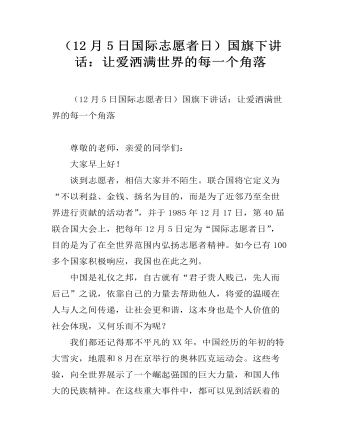
(12月5日国际志愿者日)国旗下讲话:让爱洒满世界的每一个角落
谈到志愿者,相信大家并不陌生。联合国将它定义为“不以利益、金钱、扬名为目的,而是为了近邻乃至全世界进行贡献的活动者”,并于1985年12月17日,第40届联合国大会上,把每年12月5日定为“国际志愿者日”,目的是为了在全世界范围内弘扬志愿者精神。如今已有100多个国家积极响应,我国也在此之列。中国是礼仪之邦,自古就有“君子贵人贱己,先人而后己”之说,依靠自己的力量去帮助他人,将爱的温暖在人与人之间传递,让社会更和谐,这本身也是个人价值的社会体现,又何乐而不为呢?我们都还记得那不平凡的XX年,中国经历的年初的特大雪灾,地震和8月在京举行的奥林匹克运动会。这些考验,向全世界展示了一个崛起强国的巨大力量,和国人伟大的民族精神。在这些重大事件中,都可以见到活跃着的一些身影,是的,他们是志愿者。他们奋不顾身赶赴灾区,运输救灾物质,帮助受难群众。他们不计名利,默默奉献,为人们重建家园,他们用爱心、关怀、抚慰人们受伤的心灵。他们以热情、礼貌、智慧向来自四面八方的宾朋展示中国的魅力。当我们再回想起这一幕幕场景时,怎能忘记这些可爱的志愿者们,所付出的一切呢?
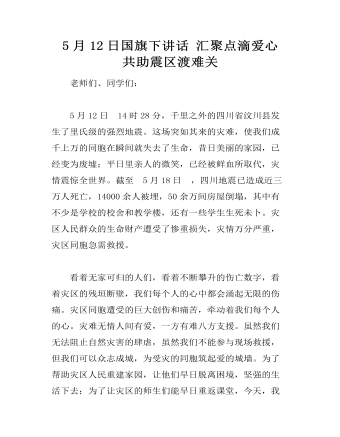
5月12日国旗下讲话汇聚点滴爱心 共助震区渡难关
5月12日 14时28分,千里之外的四川省汶川县发生了里氏级的强烈地震。这场突如其来的灾难,使我们成千上万的同胞在瞬间就失去了生命,昔日美丽的家园,已经变为废墟;平日里亲人的微笑,已经被鲜血所取代,灾情震惊全世界。截至 5月18日 ,四川地震已造成近三万人死亡,14000余人被埋,50余万间房屋倒塌,其中有不少是学校的校舍和教学楼,还有一些学生生死未卜。灾区人民群众的生命财产遭受了惨重损失,灾情万分严重,灾区同胞急需救援。看着无家可归的人们,看着不断攀升的伤亡数字,看着灾区的残垣断壁,我们每个人的心中都会涌起无限的伤痛。灾区同胞遭受的巨大创伤和痛苦,牵动着我们每个人的心。灾难无情人间有爱,一方有难八方支援。虽然我们无法阻止自然灾害的肆虐,虽然我们不能参与现场救援,但我们可以众志成城,为受灾的同胞筑起爱的城墙。为了帮助灾区人民重建家园,让他们早日脱离困境,坚强的生活下去;为了让灾区的师生们能早日重返课堂,今天,我们全体师生聚集在这里,化悲痛为力量,开展“向地震灾区同胞献爱心”活动,以捐款方式为灾区人民提供援助。
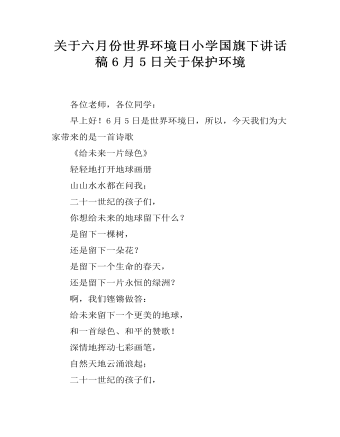
关于六月份世界环境日小学国旗下讲话稿6月5日关于保护环境
各位老师,各位同学:早上好!6月5日是世界环境日,所以,今天我们为大家带来的是一首诗歌《给未来一片绿色》轻轻地打开地球画册山山水水都在问我;二十一世纪的孩子们,你想给未来的地球留下什么?是留下一棵树,还是留下一朵花?是留下一个生命的春天,还是留下一片永恒的绿洲?啊,我们铿锵做答:给未来留下一个更美的地球,和一首绿色、和平的赞歌!深情地挥动七彩画笔,自然天地云涌浪起;二十一世纪的孩子们,

新人教版高中英语必修3Unit 5 The Value of Money-Discovering Useful Structures导学案
4.They were going to find someone to take part in their bet when they saw Henry walking on the street outside.[归纳]1.过去将来时的基本构成和用法过去将来时由“would+动词原形”构成,主要表示从过去某一时间来看将要发生的动作(尤其用于宾语从句中),还可以表示过去的动作习惯或倾向。Jeff knew he would be tired the next day.He promised that he would not open the letter until 2 o'clock.She said that she wouldn't do that again.2.表示过去将来时的其他表达法(1)was/were going to+动词原形:该结构有两个主要用法,一是表示过去的打算,二是表示在过去看来有迹象表明将要发生某事。I thought it was going to rain.(2)was/were to+动词原形:主要表示过去按计划或安排要做的事情。She said she was to get married next month.(3)was/were about to+动词原形:表示在过去看来即将要发生的动作,由于本身已含有“即将”的意味,所以不再与表示具体的将来时间状语连用。I was about to go to bed when the phone rang.(4)was/were+现在分词:表示在过去看来即将发生的动作,通常可用于该结构中的动词是come,go,leave,arrive,begin,start,stop,close,open,die,join,borrow,buy等瞬间动词。Jack said he was leaving tomorrow.

新人教版高中英语必修3Unit 5 The Value of Money- Discovering Useful Structure教学设计
Step 3 Meaning1. 过去将来时表示从过去某一时间来看将要发生的动作或存在的状态, 常用在宾语从句中。一般由“would/should +动词原形”构成。She hoped that they would meet again someday. 她希望将来有一天他们能再见面。2. was/were going to+动词原形: 表示过去将要发生或很有可能发生的动作, 常用于口语中, 表示预言、意图或者打算等。He was going to start work the following week. 他打算下星期开始工作。3. was/were about to do: 常用来表示即将发生的动作, “刚要/正要做……”。注意该结构不与任何时间状语连用。I felt that something terrible was about to happen. 我感到某种可怕的事情即将发生。4.was/were to do: 表示“曾计划做某事”, 如果表示“本来计划做某事, 动作没实现”, 则需用 “was/were to have done”。She said she was to have told me about the accident. 她说她本来想告诉我关于事故的事。5.Start, go, come, leave, see, meet等动词的过去进行时: 表示就过去某一时刻而言即将发生的动作。She was coming later. 她随后就来。I had just put on my overcoat and was leaving to visit a friend of mine. 我刚穿上外套要去看我的一个朋友。

新人教版高中英语必修3Unit 5 The Value of Money-Listening &Speaking&Talking教学设计
4. A:We’d like to have someone to say a word at the beginning to welcome the group.B:↙Who?A:We thought that you or Dr.Johnson might do it.B用降调说Who,其意思是问,对方想让谁在开场时致欢迎词。Step 6 Pronunciation---Practice1. Listen to the short conversation and mark the intonation with ↗, ↙ or ↙, ↗. Then discuss with a partner what they intend to convey by using different intonation.Owner: You know what ?↗ It’s a million-pound bank note↙.Waiter 1: Really ?↗(question)Waiter 2: Really !↙(unbelievable and surprised)Waiter 3: Really ?!↙↗(first question then surprised)2. Listen to the conversations. Underline the parts that are stressed and mark the intonation. Then talk about the implied meanings of the responses with different intonations. Listen again and repeat.1) Henry: It’s a nice suit.Owner: Oh, it’s perfect!↙(The intonation means it is very suitable for Henry.)2) Henry: Well, that’s very kind of you.Owner: Kind, sir ?↗(what you said is not right) No, it’s kind of you. You must come whenever you want and have whatever you like. Just having you sit here is a great honour !!↙(welcome you to come again)3)Henry:Well, to be honest, I have none. Oliver:(happily) What luck!(excited) Brother↗, what luck!↙(It means “Didn’t you hear it?”)Henry: Well, it may seem lucky to you but not to me!↗(angry) If this is your idea of some kind of joke, I don’t think it’s very funny. Now if you’ll excuse me, I ought to be on my way.↙(If so, I would leave.)Roderick: Please don’t go↙...(hope Henry can wait for a moment)Part B Viewing and Talking---Describe people’s changing attitudes in a film clipStep 1 Before-listening---Tell the filmYou are going to watch part of the film The Million Pound Bank Note. Look at these photos and guess what happens in the film.

新人教版高中英语必修3Unit 5 The Value of Money-Listening &Speaking教学设计
Step 4: Listen again and decide if the following statements are true (T) or false (F).1 It was the first time Chen Liyan's story was reported. T口 F口2 Chen found 10,000 yuan in a small plastic bag in Taiyuan railway station口 F口3 Wang Zheng apologized to Chen because he couldn't offer her more money. T口 F口4 Chen took out a large loan to cure her daughter, T口 F口5 Wang set up a fundraising website for Chen's daughter after Chen told him about her situation. T口 F口Step 5:After listening, discuss the questions.1 What kind of person do you think Chen Liyan is?Chen Liyan is generous and honest because she returned a large sum of money to the owner.2 Did Chen return the money because she didn't need it?No. She returned the money because it was the right thing to do. Evidence for this is that she refused to accept the reward money because she felt that it had not been earned. 3 Is it common for people to do what Chen did?It depends on the culture. In some countries it is quite common to return money that has been found. In other countries, people believe "Finders are keepers!" 4 How did Wang Zheng feel about the return of his money?He must have been very happy and relieved to have gotten his money back. We know this because he thanked Chen repeatedly and even offered her a reward.5 Why did Ma Dongbao tell Wang about Chen's family?He must have had great sympathy for Chen and her daughter and wanted to help them.'We know this because he arranged help for them. 6 How did the news reporter feel about Chen's actions?The news reporter felt that it showed that money wasn't the most important thing in life. We know this because the reporter told us that this is what Chen believes. and then said, “that's a great attitude to take."

新人教版高中英语必修3Unit 5 The value of money-Reading and Thinking教学设计二
? Could you offer me some kind of work here?? I don’t want your charity, I just want an honest job.? Careless: I landed in Britain by accident.Step 7:Consolidation.? Find Henry? Roderick and Oliver were I .making a bet when they saw Henry, a poor young man. ? Know Henry? About a month ago, Henry was sailing and later he found himself carried out to sea by a strong wind. Fortunately, he 2.was spotted by a ship. And it was the ship that brought him to 3.England? Offer money to Henry ? Oliver and Roderick gave Henry a letter and told him that there was money in it. They 4.persuaded him to accept it, and made him 5.promise that it wouldn't be opened until 2 o'clock.Step 8:Language pointsa large amount of: a large quantity of; a great deal ofe.g. They bought a large amount of furniture before they moved their new house.make a bet: make an arrangement to risk money, etc. on an event of which the result is doubtful.e.g. We made a bet on the result of the match.permit sb to do something: allow somebody to do somethinge.g. My mother doesn’t permit me to ride in the street after it rained.by accident: as a result of chancee.g. I only found it by accident.stare at: look at somebody or something with the eyes wide open in a fixed gaze( in astonishment, wonder, fear, etc)to be honest: to tell you the truth; to be franke.g. To be honest, I don’t think we have a chance of winning.Step7 Homework:What do you think will happen to Henry? Will the bank-note help him or get him into trouble?

新人教版高中英语必修3Unit 5 The Value of Money-Reading and Thinking教学设计一
Everybody wants to get wealth.In today’s material world,making money or becoming wealthy symbolizes a person’s success and capability. Many people just make every effort, pay any price to attain greater wealth. With money,they can buy nice, large apartments in nice neighborhood. With money they can own luxurious cars. Wealth seems to bring all happiness in life.But is wealth the only road to happiness? Not really. There are many things in the world, which are beyond the means of money, such as friendship, love, health and knowledge. People are so preoccupied with struggling for money that they have no time or would not take the time to form or maintain friendship. What happiness can they feel living as lonely miserable creatures without love or friends in the world even if they accumulate tremendous wealth?In my opinion, people can’t do anything without money, but money is not everything. What money will bring you depends on your personal belief and goal in life. If you are kind enough to help others, especially the poor, money is a good thing to you. With it, you can do much more for the benefit of people and your country, and it will add to your own happiness. If you want money just for your own needs, you’ll never be satisfied or happy. In a word,you should have money spent for more people. Only then can money be the source of your happiness.Step 8 Homework4 students in a group, one acts Roderick, one Oliver, one servant and the fourth one acts Henry Adams, then listen to the tape, pay more attention to the difference between American English and British English in pronunciation, stress, tone.

新人教版高中英语必修3Unit 5 The Value of Money-Reading for Writing教学设计二
2. 您能看到, 我头发太长了。You can see that my hair is much too long.3. 无论什么时候, 只要您想回来就回来。Please come back whenever you want.4. 您仅有很少的头发要理! You only have too little hair to cut !5. 为您服务是我的荣幸!It is my honour to serve you!Step 9 Writing(Henry is walking down the street when he sees a sign for a place that cuts hair. He decides to have it cut. )H=Henry B=BarberH: Good afternoon, I’d like to have my hair cut, if I may. (The barber looks at Henry’s hair and continues cutting another man’s hair. ) Er, I’d really like a haircut. As you can see it’s much too long. B: (in a rude manner) Yes, I can see that. Indeed, I can. H: Fine, well, I’ll have a seat then. (He sits in one of the barber’s chairs. The barber turns to look at Henry. )B: It’s quite expensive here, you know! Are you sure you can afford it?H: Yes. I think so. (After his hair is cut, the barber tells Henry how much he must pay. Henry shows the barber the bank note. )B: Why Mr. . . (looks shocked)H: Adams. Henry Adams. I’m sorry. I don’t have any change. B: Please don’t worry! (wearing a big smile) Nothing to worry about! Nothing at all! Please come back whenever you want, even if you only have too little hair to cut! It will be my honour to serve you!Step 10 Pair workExchange drafts with a partner. Use this checklist to help your partner revise his/her draft.1. Are all the elements of a play included and in good order ?2. Do the character use suitable language ?3. Are the stage directions clear and useful ?4. Is the plot clear and exciting enough ?

新人教版高中英语必修3Unit 5 the value of money-Reading For Writing教学设计一
【参考范文】Narrator:(Henry is smiling as he leaves the restaurant. As he is walking down the street, he sees a sign for a place that cuts hair. He decides to get it cut. )H=Henry;B=Barber;R=rude manH:Good afternoon, I'd like to get a cut, if I may. (The barber looks at Henry's hair and continues cutting another man's hair. )Er, I'd really like a haircut. As you can see it's much too long. B:(in a rude manner) Yes, I can see that. Indeed, I can. H:Fine, well I'll have a seat then. (He sits in one of the barber's chairs. The barber turns to look at Henry. )B:It's quite expensive here, you know!Are you sure you can afford it?H:Yes. I think so. (In comes the rude man. )R:Hey you there. I need a haircut quickly. Can you do me straightaway?B:All right, then, get in the chair and I'll see what I can do. R:Thank you. (sits down in one of the barber's chairs)H:Excuse me, but I was here first. Aren't you going to do my hair first?B:This man's in a hurry. H:Well so am I!I insist that you cut my hair first. B:OK, but I'll have to be quick. This gentleman is waiting. H:Thank you. (They both become quiet. After his hair is cut, the barber tells Henry how much he must pay. Henry shows the barber the bank note. )B:Why, Mr . . . (looks shocked)H:Adams. Henry Adams. I'm sorry, I don't have any change. R:You're that Mr Adams! Well,I'm glad I waited or I might never have known it was you. B:Why, Mr Adams, please don't worry!(wearing a big smile) Nothing to worry about!Nothing at all!Please come back any time, even if you only need too little hairs cut!It will be my honour to serve you!

新人教版高中英语选修2Unit 5 First Aid-Discovering useful structures教学设计
You have no excuse for not going.你没有理由不去。He was punished for not having finished his homework.他因未完成作业而受到惩罚。2.动词ing形式复合结构由物主代词或人称代词宾格、名词所有格或普通格加动词ing,即“sb./sb.'s+doing”构成。动词ing形式的复合结构实际上是给动词ing形式加了一个逻辑主语。动词ing形式的复合结构有四种形式:①形容词性物主代词+动词ing②名词所有格+动词ing③代词宾格+动词ing④名词+动词ingHer coming to help encouraged all of us.她来帮忙鼓舞了我们所有人。The baby was made awake by the door suddenly shutting.这个婴儿被突然的关门声吵醒了。Can you imagine him/Jack cooking at home?你能想象他/杰克在家做饭的样子吗?无生命名词无论是作主语还是作宾语都不能用第②种形式。Tom's winning first prize last year impressed me a lot.汤姆去年得了一等奖使我印象深刻。Do you mind my/me/Jack's/Jack leaving now?你介意我/杰克现在离开吗?Excuse me for my not coming on time.很抱歉我没能按时来。His father's being ill made him worried.他父亲病了,他很担心。We are looking forward to the singer's/the singer to give us a concert.我们盼望着这位歌手来给我们举办一场演唱会。
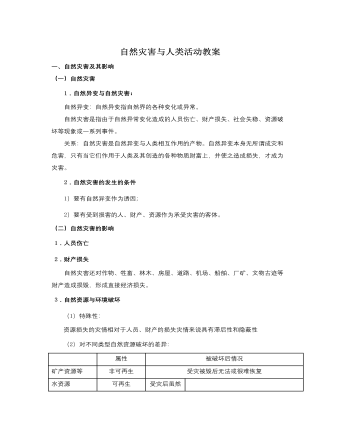
人教版高中地理选修5自然灾害与人类活动教案
(1)类型:常见的农作物病害有:稻瘟病、小麦锈病、棉花枯萎病、烟草炭疽病等。常见的森林病害有:杨树烂皮病、松疱锈病、溶叶病、泡桐丛枝病等。(2)病害发生的原因:A.气候变异等造成的不良环境使得作物对病害抗性降低。B.外来病原体入侵也是病害流行的主要原因。(3)危害:病害使农作物、树木染病从而枯萎甚至死株,导致大面积农田、森林被毁坏。2.虫害和鼠害(1)虫害的常见类型①常见的农作物虫害有:蝗虫、黏虫、水稻螟、棉铃虫等。其中危害最大的是蝗虫。②常见的森林虫害有松材线虫、松毛虫、杨树蛀干害虫、泡桐大袋蛾等。其中松材线虫是世界上最具危险性的森林虫害,被列为国际、国内重大检疫对象。(2)鼠害及危害①重灾区:农田、牧场及森林。②危害:害鼠啃食植株,在地下打洞,危害植物根系,使农业减产,森林草地遭到破坏。(3)虫、鼠害的特点:繁殖快、适应能力强(4)造成虫害和鼠害流行的因素:①适宜繁殖的气候条件、②自然或人为因素造成的天敌减少等,
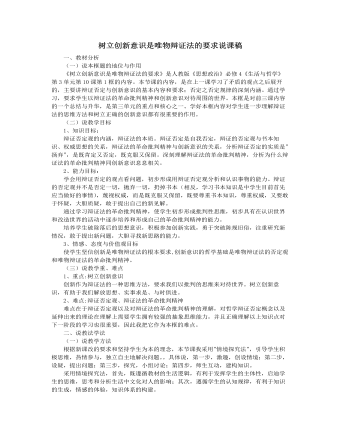
人教版高中政治必修4树立创新意识是唯物辩证法的要求说课稿(一)
(二)说学法指导把“学习的主动权还给学生”,倡导“自主、合作、探究”的学习方式,因而,我在教学过程中特别重视创造学生自主参与,合作交流的机会,充分利用学生已获得的生活体验,通过相关现象的再现,激发学生主动参与,积极思考,分析现象背后的哲学理论依据,帮助学生树立批判精神和创新意识,从而增强教学效果,让学生在自己思维的活跃中领会本节课的重点难点。(三)说教学手段:我运用多媒体辅助教学,展示富有感染力的各种现象和场景,营造一个形象生动的课堂气氛。三、说教学过程教学过程坚持"情境探究法",分为"导入新课——推进新课——走进生活"三个层次,环环相扣,逐步推进,帮助学生完成由感性认识到理性认识的飞跃。下面我重点简述一下对教学过程的设计。
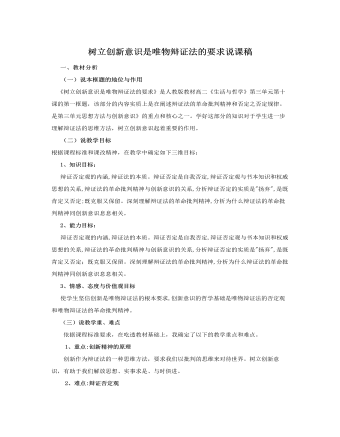
人教版高中政治必修4树立创新意识是唯物辩证法的要求说课稿(二)
一、教材分析(一)说本框题的地位与作用《树立创新意识是唯物辩证法的要求》是人教版教材高二《生活与哲学》第三单元第十课的第一框题,该部分的内容实质上是在阐述辩证法的革命批判精神和否定之否定规律。是第三单元思想方法与创新意识》的重点和核心之一。学好这部分的知识对于学生进一步理解辩证法的思维方法,树立创新意识起着重要的作用。(二)说教学目标根据课程标准和课改精神,在教学中确定如下三维目标:1、知识目标:辩证否定观的内涵,辩证法的本质。辩证否定是自我否定,辩证否定观与书本知识和权威思想的关系,辩证法的革命批判精神与创新意识的关系,分析辩证否定的实质是"扬弃",是既肯定又否定;既克服又保留。深刻理解辩证法的革命批判精神,分析为什么辩证法的革命批判精神同创新意识息息相关。
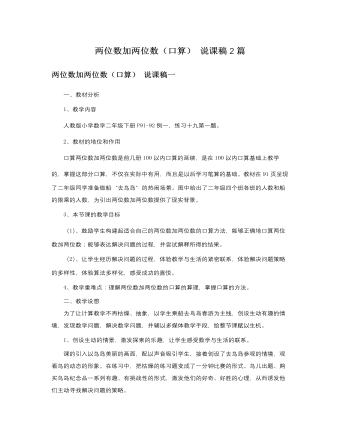
人教版新课标小学数学二年级下册两位数加两位数(口算)说课稿2篇
(四)、课堂总结、体验成功引导学生对所学知识、学习方法、学习结果、情感等进行全面总结,让学生体验学习的成功感,同时,进一步系统、完善知识结构。总之,本课的教学设计力求体现“以学生为本”的教学理念,具体体现在以下几个方面:(一)、创设生动的情景,激发探索的乐趣,让学生感受数学与生活的联系。课的引入以一幅学生经常接触的,喜闻乐见的购买玩具这一题材为切入点。在练习设计中,改变枯燥抽象的数字计算练习,选取了一组寓有童趣的素材。它们以丰富多彩的呈现方式深深地吸引着学生,使他们认识到现实生活中蕴含着大量的数学信息,使学生感到有趣、有挑战性,激发他们好奇,好胜的心理,从而诱发他们去主动寻求解决问题的策略,同时体验到数学与生活的联系。
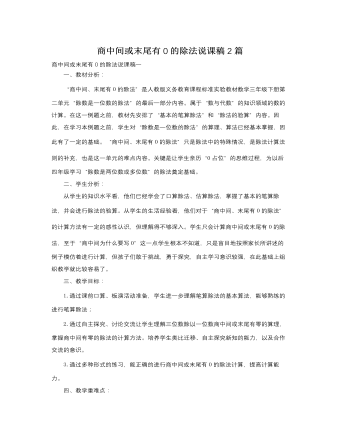
人教版新课标小学数学三年级下册商中间或末尾有0的除法说课稿2篇
教法、学法分析我通过阅读教材、教参和新课标,分析学生学习状况,认为对这一教学内容理解起来比较容易。所以,在教学时我准备采取以下策略:1、放手让学生自主解决问题,尝试计算例7的1、2题。再通过学生口述计算过程,教师设问、强调重点使学生掌握本节课知识。2、通过学生反复叙述算理,培养学生口头表达能力,并使他们自主探索“被除数中间或末尾没有0,商中间或末尾有0”这一知识形成的过程。教学目标1、在熟练掌握一位数笔算除法法则的基础上,会正确计算商中间或末尾有0的除法的另一种情况。2、能熟练地进行商中间有零和末尾有零的除法,形成一定的笔算技能。3、能结合具体情境估算三位数除以一位数的商,增强估算的意识和能力。
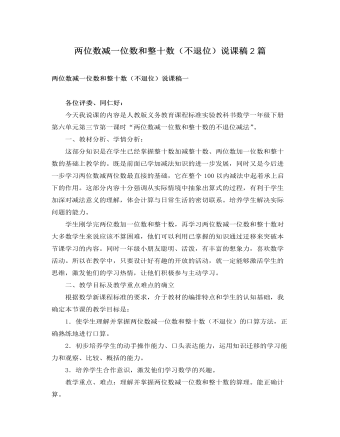
人教版新课标小学数学一年级下册两位数减一位数和整十数(不退位)说课稿2篇
3、教学目标及教学重点难点根据课标的要求,介于教材的特点和学生实际,我确定本节课的教学目标是:(1)、知识与技能:让学生经历探索两位数减一位数和整十数(不退位)的计算方法的过程,掌握计算方法,能正确地口算。(2)、过程与方法:让学生经历自主探索、动手操作、合作交流等方式获得新知的过程,积累数学活动的经验,体会数学知识与日常生活的密切联系,增强应用意识。 (3)、情感态度与价值观:进一步培养学生学习数学的热情,以及积极思考、动手实践并与同学合作学习的态度。其中,掌握两位数减一位数和整十数(不退位)的口算方法是重点,理解算理,把握两位数减一位数与两位数减整十数在计算过程中的相同点与不同点是难点。
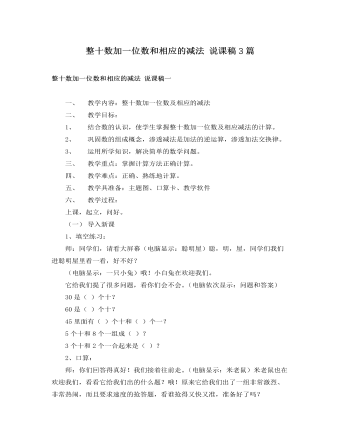
人教版新课标小学数学一年级下册整十数加一位数和相应的减法 说课稿3篇
(四)、反馈练习1.口算:看谁算得又对又快。学生在书上做第43页的第5题,限时2分钟。学生做题,教师计时,做后集体订正,并指名说说自己是怎样做75-5,90+8这两道题的。[通过计时计算,可提高学生的自信度,通过说两题的计算过程,加强对新知的巩固程度。]2.做第43页的第6题。在这里将首先运用多媒体教学课件表现出课本上两人对话的场景(有老师3名,学生40名,45瓶矿泉水够吗?),使学生看后发表自己的意见,如果自己在此时遇到这样的问题会怎么办,并说说自己是怎样想的,会用算式表达的同学,可以列出算式来。[充分利用现代化设备为学生的思维创设情境,使学生的思维尽可能地与现实生活相联系,以生活实际中的问题来锻炼学生的思维能力,并让学生体会到生活中处处有数学。为了让学生有不同的发展,可让程度较好的学生把自己的思维过程抽象成数学算式。]
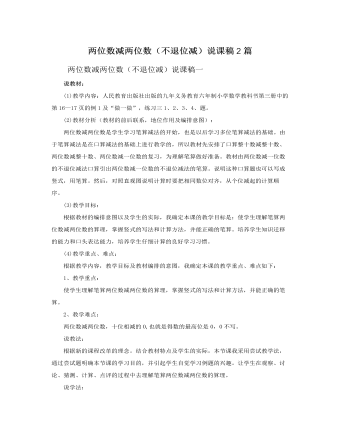
人教版新课标小学数学二年级上册两位数减两位数(不退位减)说课稿2篇
说教材:(1)教学内容:人民教育出版社出版的九年义务教育六年制小学数学教科书第三册中的第16—17页的例1及“做一做”,练习三1、2、3、4、题。(2)教材分析(教材的前后联系,地位作用及编排意图):两位数减两位数是学生学习笔算减法的开始,也是以后学习多位笔算减法的基础。由于笔算减法是在口算减法的基础上进行教学的,所以教材先安排了口算整十数减整十数、两位数减整十数、两位数减一位数的复习,为理解笔算做好准备。教材由两位数减一位数的不退位减法口算引出两位数减一位数的不退位减法的笔算。说明这种口算题也可以写成竖式,用笔算。然后,对照直观图说明计算时要把相同数位对齐,从个位减起的计算顺序。(3)教学目标:根据教材的编排意图以及学生的实际,我确定本课的教学目标是:使学生理解笔算两位数减两位数的算理,掌握竖式的写法和计算方法,并能正确的笔算。培养学生知识迁移的能力和口头表达能力,培养学生仔细计算的良好学习习惯。